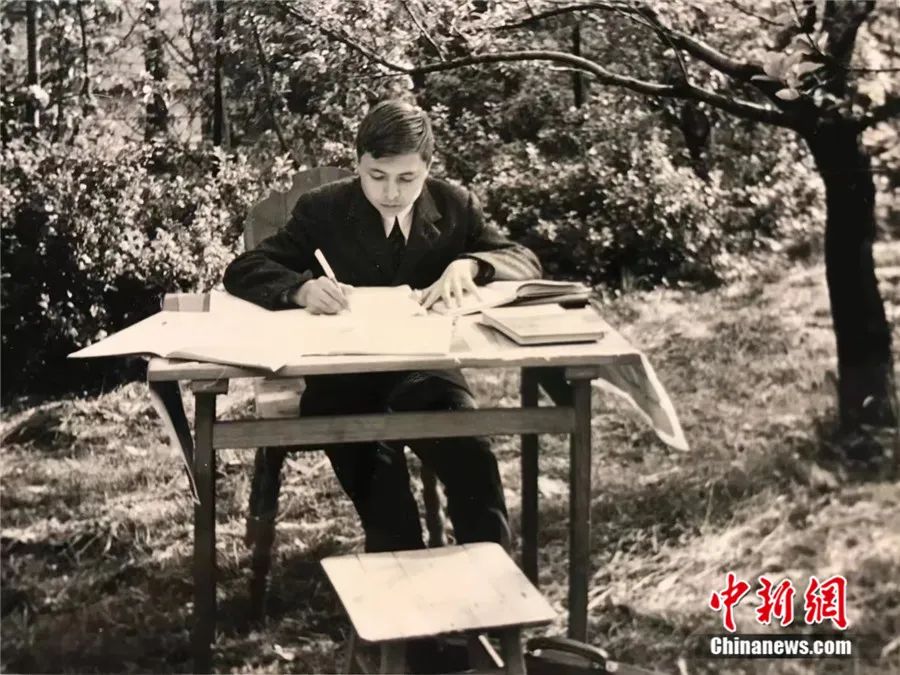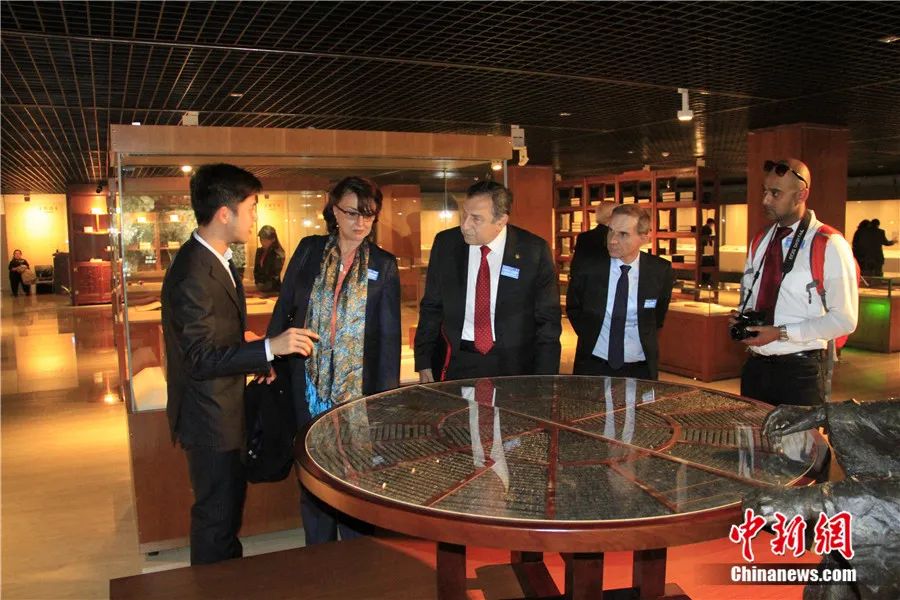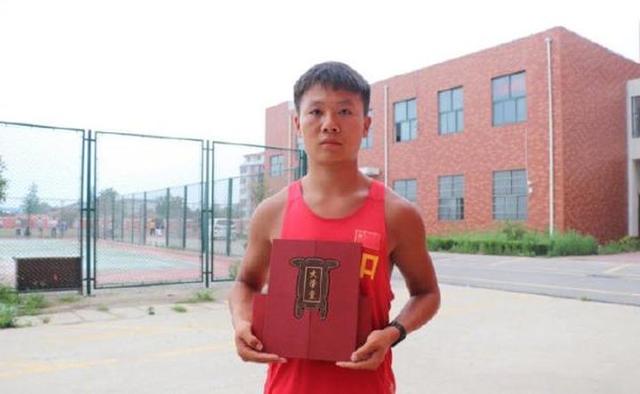Austrian Sinologist Li Xiade: Why do you need to understand the history of the past?|
Author:China News Weekly Time:2022.08.27

I suggest that the West knows China from one -handed material
Because the first -hand material truly introduces the history of China
Avoid the distortion and possible misunderstandings of culture during the spread of culture
Author: Li Jingze Ma Shuaiha
Number of full text: 2820
Estimated reading time: 9 minutes

In 1975, Austrian college student Li Xiade (Richam Trapur) embarked on a train to China, Vienna -Moscow -Beijing, all the way east, lasted more than ten days. The visits not far away opened the door of his understanding and understanding of China. For decades, Li Xiade continued to pay attention to Chinese culture and became a sinologist who studied in ancient China, modern literature and history.
Since the establishment of the Confucius Institute at the University of Vienna in 2006, Li Xiade has been the president of the Austrian side and is committed to promoting local Chinese education and cross -cultural exchanges. Recently, in an exclusive interview with China News Agency's "East and West Questions", he said that China ’s development achievements have benefited from the financial accumulation of thousands of years. If you want to understand China today, we must comprehensively study China's past history and culture. Look at China with your eyes.
Abstracts are currently recorded as follows:
Reporter of China News Agency: As the first student of the Department of Sinology at the University of Vienna, what kind of puzzlement do you have with China? What prompts you to devote you to the study of Chinese culture for nearly 50 years?
Li Xiade: I became interested in Chinese characters when I was ten years old. Unfortunately, Europe did not learn Chinese in Europe in the 1950s and 1960s. In October 1973, at the University of Vienna set up a Sinology Department, I was one of the first students. Occasionally, I applied for a Chinese government scholarship. After more than ten days of train, I walked through Siberia to Beijing and studied two semesters at Beijing Language Institute (now Beijing Language University).
In the spare time, I rode a bicycle through the streets and alleys in Beijing, and the total mileage of the cycling exceeded 2,000 kilometers. At that time, there were very few vehicles on the Beijing road, and the city was quiet at night. Today, compared with 1975, there may be only those street names that have not changed in Beijing. At that time, the streets I rode through the bicycle had become a wide urban high -speed highway. The single -story buildings passing by were also replaced by high -rise buildings. After the study of Bei language, I started traveling around China, and the Pudong I saw was still a farmland.
In the past 50 years, I have witnessed China's vicissitudes. What impressed me was that the Chinese people's ideas became more open. In the 1970s, if foreign students wanted to call their families, they had to go to the telephone building on Chang'an Street and waited for about an hour before they would call themselves for a few minutes. Now, in China or Austria, we can always use social software to contact friends at any time.
I was originally interested in Chinese and Chinese characters in China. After going to China, in addition to Chinese, I have a strong interest in literature, philosophy, culture, and various aspects of China in various aspects of China, and have done some research. Later, I returned to the Department of Sinology at the University of Vienna as a teacher. Although retired now, I still insist on teaching Chinese literature courses.

In 1967, 16 -year -old Li Xiade was studying Chinese. Interviewee confidence
Reporter of China News Agency: From then on the Department of Sinology, he studied in the Department of Sinology and later became a sinologist and dean of the Confucius Institute. How did you conduct research on Sinology, especially ancient Chinese literature, which inspiration this process brought you?
Li Xiade: As the research on Chinese literature is getting deeper and deeper, I start to think about how to study Chinese literature and let the world understand the history of Chinese thought? How to study Chinese classical philosophy so that people can understand Chinese social history? I think this needs to study traditional Chinese culture, and also pay attention to the representative literature of the 20th and 21st centuries, and strive to have a comprehensive system for the history of Chinese culture and literature.
During the research process, I will understand the relationship between Chinese scientists and writers of Chinese, personal and society, and existing understanding of the relationship between Chinese scientists and writers. Comparison of relationships.
Many ideas contained in Chinese culture have enlightened me. My post -doctoral dissertation is subject to "The theory of Literature of the Wei, Jin, Southern and Northern Dynasties", in which the important document of "Wen Xin Da Dragon" is mainly studied. It teaches me how to view this world: appreciate and respect life with humility. Especially in today's world, respect for everyone and every nation, and recognizing the development of history is more significant. In order to express my respect for "The Dragon of Wenxin", I also named the college of the Confucius Institute at the University of Vienna, Austria as "Wen Xin".
When I was through the wisdom of the ancient Chinese in "The Dragon of Wenxin", I began to look at the earth from the distant universe, and found that the time of each life seemed to be so short in the universe, and it was no exaggeration to cherish its existence. If people can realize this, they should treat themselves more rationally and fairly, to deal with the relationship between others, culture and society, and handle the relationship between people and nature.

Nanjing "Liu Ye and Wen Xin Diao Dragon Memorial". China News Agency reporter Yun Bo Photo
Reporter of China News Agency: How has the West's understanding and research on Sinology in the West these years? What do you think of this change? How should we promote the exchange of Chinese and Western cultural exchanges in the future?
Li Xiade: In the 1970s, the Western Sinology community mainly studied Chinese classical literature, classical philosophy and classical society. After the reform and opening up, the research of Sinology in the West is increasingly dominated by contemporary China, especially from the perspective of political, economic, and social development. The research direction of the Department of Sinology has also shifted from literature and philosophy to sociology and political science. Especially now sinologists like to use sociology and political perspectives to study China. In my opinion, with the development of China, the transformation of the research perspective of the Western Sinology community in China is natural, but the achievements of China are not accidental, but due to thousands of years of ideas. To study China in the West, there must be a comprehensive research. It must not be just classical, nor is it just facing contemporary China.
There are some thinking and traditions beyond historical limitations in Chinese culture, which can learn from today. For example, in the past, the imperial examinations required to learn Confucianism, and their requirements for studies, the emphasis on cultivation and culture have a very important role in the present and the future; Confucianism believes that individuals should contribute to the country, and the country should protect individuals. This kind of thought is still affecting the choice of China's development path; in addition, Confucianism and Taoist thought have a deep understanding of nature, emphasizing the responsibility of individuals and the country to nature. The country also has a good reference significance.
If you want to understand China, you must study the Chinese history of at least 2500 years in the past, including Chinese cultural history and ideas. Research on China should not only look at one stage, but a comprehensive study that runs through history, which requires scholars' research to continue and deepen.
It should be noted that, in view of the different historical origins of Chinese and Western, in the process of cultural exchanges, various obstacles caused by various cross -language, cross -cultural and even different systems will be encountered, but these differences also constitute a friendly dialogue between China and foreign countries. Starting point, because in this process, both sides are trying to explore the commonality of each other in culture. We should strengthen the research on each other's history and culture in the exchange, build a bridge for the exchange of people in all ages, and pay special attention to the cultivation of international vision in education.
Sinologists visited the "Rotary Rotation Disk" of the Yuan Dynasty Wooden Word inventor Wang Yan in the "National Museum of Classics" in Beijing. Photo by Zhongxin, China News Agency

Reporter of China News Agency: As a representative of the University of Vienna, Austria, what efforts do you make on promoting the exchanges between the University of Vienna and the Chinese universities and the cultural exchanges between China and Australia? What do you think of today's world to understand Chinese culture and what is special significance?
Li Xiade: From the end of the 1970s, I first arrived in China once a year, and later became three or five times a year. Later, I went to China almost every month. To Hainan, the east to Shanhaiguan, west to Xinjiang. Rich communication experience shows that not only the cooperation between institutions is important, but the contact and friendship of people are more important.
I have been engaged in Chinese education in Austria for many years, and I have been the dean of the Confucius Institute at the University of Vienna for 16 years. Not only did I communicate with Chinese teachers at the Confucius Institute, but I also kept close contact with Chinese friends by phone. I hope that more people can have the opportunity to go to China, look at the development of China and the work of Chinese people, and use their own hearts and eyes to know China. Of course, I also welcome Chinese experts, friends and all ordinary Chinese people to have the opportunity to come to Austria.
Li Xiade participated in the 2014 · China Tibet Development Forum in Lhasa. Interviewee confidence

Considering the differences in the Chinese and Western language system, starting from the long -term experience of individuals, I think that learning Chinese can provide people with a deeper opportunity to understand China. I suggest that the West knows China from one -handed material, because the first -hand material truly introduces the history of China, and avoids the distortion and possible misunderstandings of culture in the process of communication.
In recent years, Western media, politics, and economic circles have been interested in China, but there are also so -called "Chinese threat theory" noise. I think it is because they are not enough to know China. Cultural exchanges between China and the West are very important. Some cultural misunderstandings or inadequate understanding are bringing risks. Regardless of nationality, nation, and skin tone, humans are the community of destiny and should go to unity, not to engage in opposition or even division. Whether it is Austria, or Europe, or even the Western world, we should enhance our understanding of China.
Introduction to the interviewee:
Li Xiade, a Austrian Sinologist, the Confucius Institute at the University of Vienna, the dean of the Confucius Institute at the University of Vienna, a guest professor at Beijing Language University, and the honorary professor of China University of Political Science and Law, mainly engaged in the study of Chinese classical and modern literature, Chinese and Western cultural exchanges.

Text Editing: An Yingzhao
Image editor: Sudan
- END -
Break the test record 100 meters 10 seconds 64, the students of Shandong No. 1 Middle School "run into" Peking University

On July 18, Li Zhiwei, a student of Dongming Vocational Technical School, Shandong...
Guanghua Road Street, Qinhuai District, Nanjing: "Starlight Reading" in the tent makes reading the most beautiful scenery

Dragon Tiger Net News (Reporter Dai Meimei) Pay tribute to a century -old way to r...